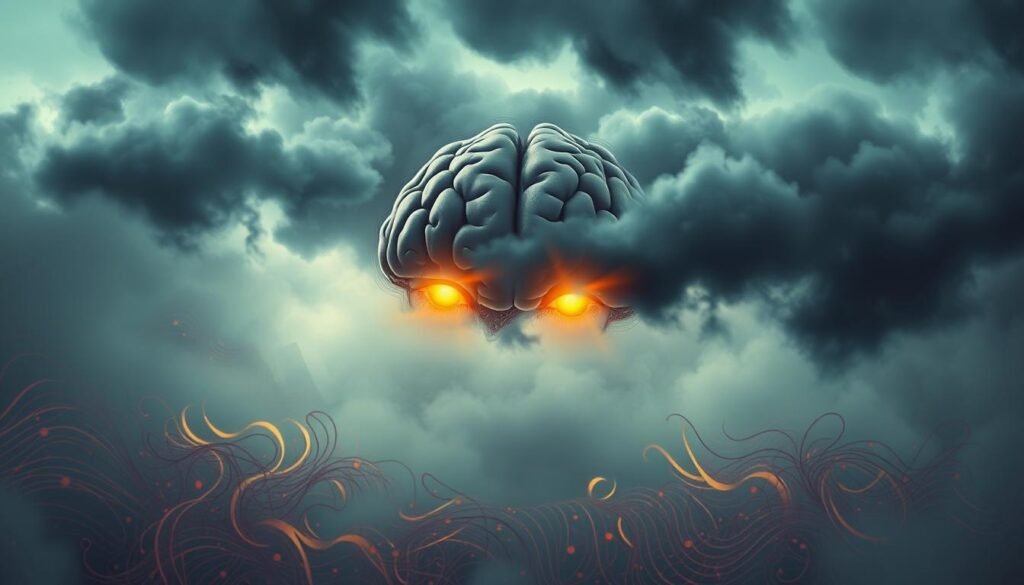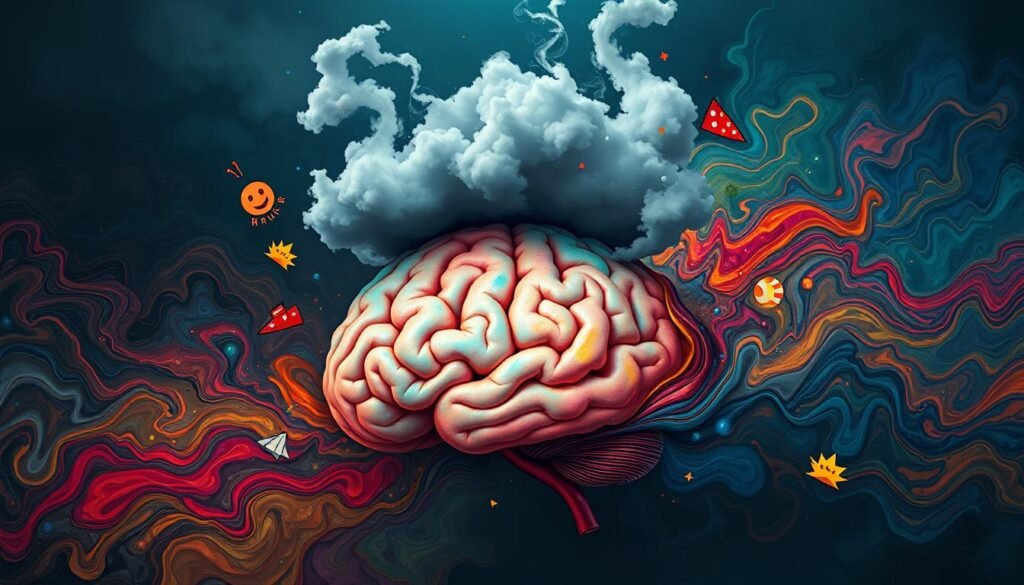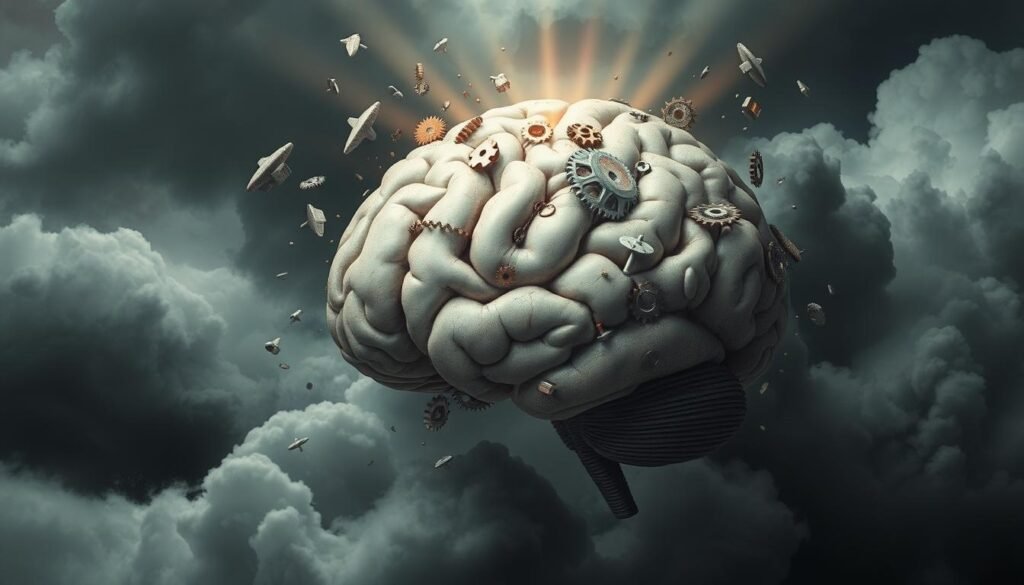Almost three-quarters of workers have felt mentally exhausted since the coronavirus started. This large number shows many people are struggling in today’s fast world. Mental exhaustion isn’t just feeling tired. It can really affect how well we think. This leads to trouble focusing, feeling emotionally numb, and even physical pain.
When work, family, and personal tasks pile up, we might face these symptoms of brain fatigue.
It’s key to understand what mental exhaustion is. It can cause serious brain overload, making daily tasks hard. Recognizing the signs early means you can start dealing with them. To lessen these intense feelings, try getting enough sleep and practicing mindfulness. Healthline has more tips.
Key Takeaways
- Nearly 75% of workers report mental exhaustion post-pandemic.
- Symptoms can include difficulty focusing and emotional detachment.
- Chronic stress is a leading cause of mental exhaustion.
- Implementing simple self-care routines can improve mental health.
- Recognizing cognitive overload indicators is essential for intervention.
- Balancing commitments is vital to prevent overwhelming feelings.
Understanding Mental Exhaustion
Mental exhaustion comes from too much thinking or stress. It happens at work, school, or during tough times in life. It makes you feel very tired in your mind, leading to irritation, focus issues, and forgetting things. It’s important to notice it early to manage its effects better.
What is Mental Exhaustion?
Mental exhaustion shows up when you think hard for too long without breaks. Stress from jobs, home, or studying a lot can cause it. Also, feeling very angry, sad, or worried can make you mentally tired. This can make you forgetful, less driven, and even sad after a while.
Comparison with Emotional Exhaustion
Mental and emotional exhaustion are similar but target different areas. Mental exhaustion messes with your thinking and choices. Emotional exhaustion deals with feelings, making you feel empty or disconnected. When both happen together, it’s harder to handle stress. Knowing the difference helps in finding the right way to deal with them, especially under much pressure.
Common Brain Fatigue Symptoms
It’s critical to know the signs of mental exhaustion to improve well-being. Brain fatigue symptoms vary, so spotting them early is key. Recognizing these signs helps in finding ways to cope.
Key Indicators of Mental Exhaustion
Some common signs of mental exhaustion are:
- Persistent Lethargy: Feeling constantly tired can mean you’re mentally exhausted.
- Irritability: If you’re getting easily upset, it might be due to stress.
- Lack of Motivation: Struggling to feel motivated is a sign of brain fatigue.
Behavioral Changes Associated with Mental Fatigue
Behavior can change when someone is mentally exhausted:
- Procrastination: Putting off tasks is common when focus is low.
- Social Withdrawal: Pulling back from friends shows you might be overwhelmed.
- Decreased Productivity: If work is harder, mental fatigue could be why.
Physical Symptoms Linked to Mental Exhaustion
Our mental and physical health are linked. Some physical symptoms include:
- Headaches: Mental strain can cause headaches or migraines.
- Sleep Disturbances: Trouble sleeping is common with mental exhaustion.
- Altered Appetite: Stress may lead to unhealthy eating habits.
Taking action against these symptoms is important. Managing stress and changing your diet helps beat brain fatigue. For tips on eating right to fight adrenal fatigue, check out these natural remedies.

| Symptoms | Indicators | Implications |
|---|---|---|
| Brain Fatigue Symptoms | Persistent lethargy, irritability, lack of motivation | Decreased productivity, increased procrastination |
| Behavioral Changes | Social withdrawal, procrastination, decreased output | Reduced engagement in everyday tasks and relationships |
| Physical Symptoms | Headaches, sleep disturbances, altered appetite | Impact on overall health and well-being |
Identifying Signs of Cognitive Overload
Cognitive overload occurs when our brains can’t keep up with information. Today, it’s crucial to spot cognitive overload indicators to stay productive and mentally healthy. This section will discuss common signs of cognitive overload and explain mental fog symptoms.
Indicators of Cognitive Overload
People facing cognitive overload might display various symptoms, affecting their daily life. Key brain fatigue symptoms are:
- Difficulty focusing on tasks
- Making frequent errors
- Feeling overwhelmed by duties
- Growing irritability and stress
- Losing the drive to start tasks
Spotting these signs is key, especially in high-stakes jobs like healthcare. High-pressure jobs and demanding tasks can cause cognitive overload, hurting job performance and mental health. Quick action can counter serious issues, like growing mental fatigue.
Understanding Mental Fog Symptoms
Mental fog is a common side effect of cognitive overload, bringing serious mental fog symptoms. These signs include:
- Feeling confused or slow to process information
- Forgetting daily tasks
- Feeling tired or lacking energy
- Being disoriented or easily distracted
- Finding it tough to make decisions
Noticing these symptoms is crucial. Mental fog doesn’t just harm one’s health but can also impact work safety and dynamics. Studies reveal that in Australia, fatigue contributes to 10–40% of traffic accidents. This shows the dangers of ignoring cognitive overload. Active steps can bring back mental clarity and sharpen focus.
Brain Fatigue Symptoms: Emotional and Behavioral Signs
It’s crucial to know the emotional and behavioral signs of brain fatigue. This condition affects mental well-being and behavior in many ways. Spotting these signs helps tackle the root issues more effectively.
Emotional Indicators of Brain Fatigue
Emotional signs are clear indicators of brain fatigue. One might feel more anxious, indifferent, or constantly sad. These feelings link cognitive stress to mental health. Recognizing them helps us see the effect of mental strain on our happiness.
How Behavioral Changes Reflect Mental Exhaustion
Behavioral shifts are key evidence of brain fatigue’s impact. When mentally drained, people might ignore their daily tasks, becoming irritable or quickly angered. Struggling to focus and lacking drive are common in daily activities. Seeing these behavioral changes shows the struggles that come with mental weariness.
Recognizing Attention Deficit Cues
Cues of attention deficit are critical, yet often missed, signs of mental tiredness. Signs like being easily distracted or unable to complete tasks point to deeper cognitive exhaustion. Promptly addressing these cues can improve managing brain fatigue and boost productivity.

| Symptoms | Emotional Indicators | Behavioral Changes | Attention Deficit Cues |
|---|---|---|---|
| Anxiety | Increased feelings of worry | Neglecting responsibilities | Distractibility |
| Indifference | Lack of emotional engagement | Irritability | Difficulty completing tasks |
| Sadness | Persistent feelings of despair | Short temper in interactions | Memory lapses |
The Impact of Chronic Stress on Mental Exhaustion
Chronic stress deeply affects our mental exhaustion. It creates a domino effect in the body, leading to lasting changes. These changes can harm our mental health. Prolonged stress raises cortisol levels. This affects our brain’s structure and way of working. These effects make us feel tired and unstable emotionally, showing various signs of mental exhaustion.
Connection Between Chronic Stress and Mental Fatigue
The link between chronic stress and getting mentally tired is well-known. High stress levels make people show signs of burnout. This includes not wanting to engage, doing less, and always feeling tired. A study with 55 people showed differences in brain structure related to mental fatigue severity. Those more mentally tired had smaller brain parts like the caudate and putamen. This shows how directly chronic stress is tied to mental fatigue, hitting our thinking and emotional strength.
Understanding Burnout Warning Signals
Knowing the burnout warning signals helps catch problems early. The signs to watch for are:
- Emotional exhaustion, feeling hopeless.
- Not feeling connected to work and feeling less accomplished.
- Being more irritable and having mood swings.
- Seeing a drop in performance and motivation.
These signs show the big impact of chronic stress. They underline the importance of handling stress well. Spotting these early can stop stress from getting worse, keeping our overall health better.

Differentiating Physical Exhaustion from Mental Exhaustion
Physical and mental exhaustion affect our well-being differently. Physical exhaustion happens after a lot of physical work or not enough rest. You might feel very tired, have a higher heart rate when resting, and your muscles could be sore for days. On the other hand, mental exhaustion comes from too much thinking. It can make you less alert and irritable. These two types of tiredness can mix, making you perform worse in daily tasks.
How Both Types of Exhaustion Affect Each Other
The link between physical and mental exhaustion is complex. Not getting 7-9 hours of sleep can make both worse. Mental tiredness can reduce how well you perform physically. But, physical tiredness doesn’t always affect your thinking. Missing sleep can make you moody, less motivated, and forgetful, but it usually doesn’t change how you do physical activities. Stress can make all this even worse. It’s important to know how physical and mental tiredness work together.
Signs of Sluggish Thinking Symptoms
To tell if you’re mentally exhausted, look for certain signs. These include:
- Slower reactions
- Struggling to finish tasks
- Getting easily annoyed or distracted
- Feeling unclear or too tired
- Putting off things you need to do
These signs show how mental tiredness affects your life. It’s vital to find ways to deal with these feelings. For more tips on spotting tiredness, check out this resource. Knowing the signs of both mental and physical exhaustion helps us stay healthy and productive.
Coping Strategies for Managing Brain Fatigue Symptoms
Understanding how to manage mental exhaustion is crucial. Different coping strategies can greatly improve mental health. Here, we share important tips and recovery methods to help take control of your mental wellness.
Effective Techniques to Combat Mental Exhaustion
For those feeling mentally tired, adopting certain coping methods is key. Look into these strategies:
- Pacing Activities: Split tasks into smaller parts. Taking regular breaks helps recover and reduces overwhelming feelings.
- Time Management: List daily tasks by priority and set realistic goals. Use planners or apps to stay organized.
- Relaxation Practices: Try mindfulness and meditation for clearer thinking. These practices help focus your mind and lower stress.
- Physical Activity: Aim for 30 minutes of exercise five times a week. This boosts mood and sleep. Moving regularly fights off tiredness.
- Nutrition Awareness: Eat slow-releasing carbs like whole grains and fruit for steady energy. Avoid sugary snacks that cause energy crashes.
The Role of Rest and Recovery in Mental Health
Rest plays a key role in better mental health and combating exhaustion. Consider these points:
- Sleep Hygiene: Have a regular sleep schedule with pre-sleep rituals. Avoid caffeine before bed and make your sleeping area peaceful.
- Mood Management: Tackle any stress or anxiety. Do things you enjoy and get emotional support if needed to fight fatigue.
- Medication Awareness: Talk to a doctor about medication for fatigue linked to conditions like depression.
Using these strategies and techniques helps in dealing with mental exhaustion. Being consistent with these practices leads to a healthier mind and better quality of life.
Preventative Measures Against Brain Fatigue
Being proactive can greatly lower the chances of feeling brain tired. It’s key to foster a work-life balance that’s healthy. Mixing this with good self-care routines boosts mental health.
Creating a Balanced Work-Life Environment
It’s vital to clearly define the line between work and personal time. Taking regular breaks helps refresh both body and mind. You could try:
- Engaging in physical exercise to boost mood and cognitive function.
- Setting specific work hours to prevent overworking.
- Minimizing digital distractions during personal time.
These steps help keep you sharp and productive while working. They lead to a healthier brain.
Importance of Self-Care Routines
Self-care is key in fighting off brain fatigue. Making time for things like:
- Getting 7 to 9 hours of quality sleep per night, essential for cognitive function and memory consolidation.
- Following a balanced diet rich in nutrients can reduce symptoms associated with brain fog.
- Practicing mindfulness or meditation to alleviate stress and improve mental clarity.
Adding these habits into your daily routine can really boost your mental health. For extra tips on managing mental tiredness, check out Healthline.
Conclusion
It’s important to know the signs of brain fatigue in our busy lives. Many people don’t realize how mental tiredness affects them. It can really impact your health and how you handle daily tasks. Knowing the signs helps you take steps to feel better.
Nearly half of those with post-concussion syndrome deal with mental tiredness. Cognitive FX shows that patients can get 60% better in just a week. These facts show how crucial it is to get help and how effective treatment can be.
We all need to look after our mental health, especially with the stress from work and life. By keeping an eye on our mental state, we can manage mental fatigue better. This leads to a healthier, more balanced life. It’s all about recognizing the problem and starting to fix it.